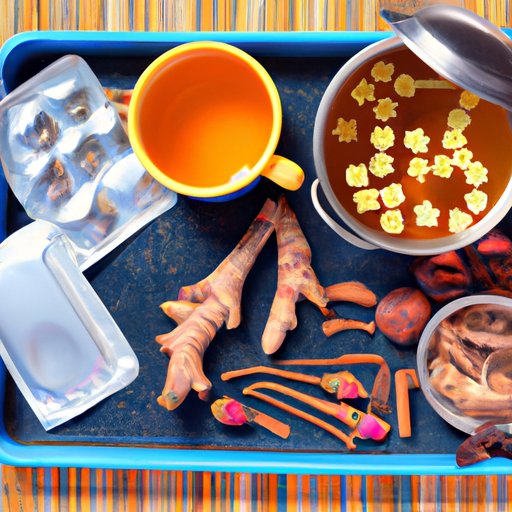
Introduction
Period cramps, also known as menstrual cramps, affect a significant number of people who menstruate. They can range from mild discomfort to debilitating pain and can have a negative impact on daily functions and quality of life. However, there are various remedies that can help alleviate period pain, both natural and pharmaceutical. In this article, we will explore natural remedies, exercise, diet, medication, acupuncture, herbal supplements, and relaxation techniques that can relieve period cramps.
Natural Remedies
Natural remedies are a popular choice for people who want to alleviate period cramps with little to no side effects. Here are some natural remedies that can help:
Drink more water: Staying hydrated can ease bloating and reduce the severity of period pain. Drink at least eight glasses of water per day. Avoid sugary and caffeinated beverages, as they promote dehydration.
Use heat therapy: Apply heat to the affected area to reduce cramps. Use a heating pad or a warm water bottle, or take a warm bath.
Try essential oils: Some essential oils, such as lavender or peppermint, have been shown to have pain-relieving properties. Apply a few drops of oil to your abdomen and massage gently.
Exercise
Exercise can offer numerous benefits for menstrual cramps. Activities such as stretching, yoga, or walking can help ease cramps by increasing blood flow and releasing endorphins, which are natural painkillers.
Here are some specific exercises that can help:
Stretching: Gently stretch your lower back and hips to reduce tension and alleviate pain.
Yoga: Some yoga poses, such as Child’s pose or Cobra pose, can stretch and strengthen the pelvic area, reduce cramps, and enhance relaxation.
Walking: Walking is an aerobic exercise that stimulates blood flow and releases endorphins, thus reducing cramps.
Diet
A healthy diet can help minimize menstrual cramps. Consuming foods that are rich in iron, magnesium, and calcium can relieve cramps and improve overall health. Avoiding processed foods and caffeine during your menstrual cycle can also help ease cramps and reduce bloating.
Here are some foods to eat and avoid during your period:
Foods to eat: Leafy green vegetables such as spinach and kale, fruits such as bananas and oranges, whole grains, nuts and seeds, and lean protein sources such as fish or tofu.
Foods to avoid: Refined sugar, caffeine, alcohol, and processed foods high in saturated fats.
Medication
Over-the-counter medications such as Ibuprofen or Aspirin can be effective in relieving menstrual cramps. Nonsteroidal anti-inflammatory drugs (NSAIDs) reduce the production of prostaglandins, hormone-like substances that cause pain and inflammation during menstruation.
Here are some tips for using medication safely and effectively:
Take medication as directed: Follow dosage instructions on the packaging or prescription label. Do not take more than the recommended dose.
Take medication early: Start taking medication as soon as you notice the first signs of cramps. Waiting until the pain is severe can reduce the effectiveness of the medication.
Be aware of side effects: NSAIDs can cause gastrointestinal problems, such as stomach ulcers or bleeding, especially if taken for a prolonged period. If you experience any side effects, consult your healthcare provider.
Acupuncture
Acupuncture, a technique originated from traditional Chinese medicine, involves the insertion of thin needles into specific points in the skin to stimulate the body’s natural healing processes. It has been shown to relieve menstrual cramps by targeting certain pressure points that reduce stress and muscle tension.
Here is some information on how to find an acupuncturist and what to expect during a session:
Find a qualified acupuncturist: Look for someone who has completed a formal acupuncture training program and is licensed by a recognized organization.
Expect an initial consultation: Your acupuncturist will ask about your medical history and symptoms to create a customized treatment plan.
Be aware of potential side effects: Acupuncture is generally safe when performed by a licensed professional. Some people may experience mild side effects, such as soreness or bruising at the needle site.
Herbal Supplements
Herbal supplements containing anti-inflammatory properties can help minimize menstrual cramps. Ginger or cinnamon, for instance, have been shown to reduce the severity and duration of period pain.
Here are some tips on using herbal supplements safely and effectively:
Consult with your healthcare provider: Some herbal supplements can interact with other medications or have potential side effects, so it’s essential to get advice from your healthcare provider before taking them.
Choose a reputable brand: Look for a brand that has a good reputation and is transparent about their sourcing and manufacturing processes.
Follow the recommended dosage: Do not exceed the recommended dose, as this can cause adverse reactions.
Relaxation Techniques
Relaxation techniques, such as massage or meditation, can alleviate menstrual cramps by reducing stress and muscle tension.
Here are some relaxation techniques that can help:
Practice deep breathing: Slow, deep breaths can help calm the mind and reduce anxiety.
Take a warm bath: Soaking in a warm bath can relax the muscles and relieve cramps.
Use aromatherapy: Essential oils, such as lavender or chamomile, can promote relaxation and reduce stress when used in a diffuser or applied topically.
Conclusion
There are various natural and pharmaceutical remedies for menstrual cramps. However, it’s essential to remember that everyone’s body is different, and it may take some trial and error to find what works best for each individual. Experiment with different remedies and speak to your healthcare provider if you have any concerns or questions about managing period cramps.





